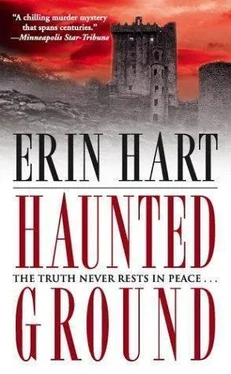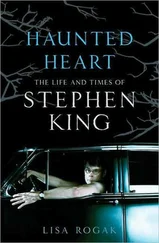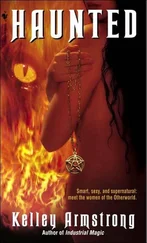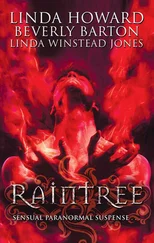“I went up to the tower. It was foggy, and when I heard something move, I fired.” It was clear he was reliving those endless seconds again, as he had every day, every night for almost three years. “I thought it was a bird.” The tears were spilling down Jeremy’s face now. His eyes focused not on Devaney, but a place somewhere on the ceiling of the hospital room, where the scene seemed to play itself out before him. Devaney could see it as well: mother and child arriving home from the village, the little boy, wearing his new red boots, climbing from the pushchair and leading his mother on a chase, or a game of hide-and-seek at the edge of the woods.
“I thought it was a bird. But it was Mina.” He recoiled at the memory. “I don’t know what she was doing there. Her eye was gone, it was all blood—” He reached up as if to touch her face before him, and his hand stopped in midair. “And then I saw she’d fallen on top of Chris. He wasn’t moving.”
“What did you do next?” Devaney asked.
It was a moment before Jeremy could respond. “I don’t remember, I just knew they were dead, and I had to cover them up,” he said, and even before he finished speaking, Devaney knew the last part was a lie. Everything the boy had said to this point had the ring of truth in it; why would he begin to lie now?
“Nobody knew about that underground passage, only me. I used to hide there. I dragged them inside, and closed up the entrance, covered it with stones. That’s why the police never found it.” Though he was nearly exhausted, the tears had stopped, and Jeremy’s voice had taken on a hard edge it hadn’t had before.
“Are you saying that you hid the bodies all on your own? That no one helped you?”
“No. There was no one else. Only me.”
“If it was an accident, Jeremy, why didn’t you come forward?”
“I don’t know, I don’t know—I was afraid.”
“What about the gun, Jeremy? What did you do with the gun? And the pushchair?”
The boy’s face suddenly betrayed confusion, and his breath began to catch in his throat. “I—I don’t remember. You’re trying to confuse me.” Devaney saw his chance and took it, not looking up to see whether Lucy Osborne was still watching.
“Listen, Jeremy, I have reason to believe that someone helped you, at least in the covering up. Why don’t you just tell me how it really happened?”
“I’ve told you. No one helped me. No one.” If anything, the boy looked even more abject and miserable than he had before he’d relieved himself of his awful burden. You think you’ve gotten rid of it, but it doesn’t go away, Devaney thought. It never goes away.
“Then tell me, Jeremy, why would you have said, ‘She’d never tell’?”
“I said that?” The boy looked horrified.
“You did. Maguire says you told him there was a place underground, then you said: ‘She knows. She’d never tell.’ You don’t remember that?”
“No. I never said that.”
“I see. Let’s go back to Christopher. The postmortem shows he had a hairline skull fracture, but the pathologist says that alone wouldn’t have been enough to kill him. How did Christopher die, Jeremy?” Devaney moved closer to the boy, spoke softly, close to his ear. Jeremy’s hands and feet began to move, and Devaney hated himself. He knew he must stage this as carefully as a performance, must persist in probing until he could sense the gnawing horror in the boy’s insides, and see it in his terrified eyes. “I’m thinking it probably wasn’t very difficult to smother him. He was small, and not very strong. Maybe he was unconscious, and never even struggled. What did you do? Did you just put your hand over his face? What did that feel like, Jeremy? What does it feel like to stop a helpless little child breathing until his heart stops? Until you know that he’s really and truly dead?”
Jeremy’s body was writhing weakly among his bedclothes, as he tried to resist the dreadful words, the even more terrible images they conjured up. “No, that’s not how it was. She fell—oh, Jesus, help me. Somebody help me—”
That was the moment at which Lucy Osborne, who had been watching through the window, could restrain herself no longer. She opened the door and came to stand beside Devaney’s chair.
“Get away from my son,” she warned in an icy voice. “I know what you’re trying to do. Leave him alone.” When Devaney stood to address her, she slapped him hard across the face. He took the blow, but seized her arm before she could strike him again. For such a slight woman, Lucy Osborne was phenomenally strong, and at first only her eyes gave away the fury she had managed for so long to contain. Then she began to laugh breathlessly, almost hysterically, and Devaney felt his stomach heave as he stood between overprotective mother and sheltered son, and only dimly began to realize that he’d had the whole thing backward all along. The relationship between parent and child had been distorted beyond all recognition, and it was Jeremy who’d been protecting his mother, not the other way around. Devaney suddenly knew that the scene as he’d played it out for Jeremy didn’t come close to the real atrocity that had taken place that day in the woods at Bracklyn House. As he stood facing Lucy Osborne, her wrist gripped tightly in his hand, he had to extinguish a savage desire to stop the laughter, to strike the woman to the ground and pummel her until he could make it stop. He looked into her eyes as he spoke the words of the official caution again, slowly and carefully, as a way to calm himself. Then he let go of her arm.
“What’s the matter, Detective?” she asked in a strangely mocking tone, as if she knew what had gone through his mind. “Hasn’t my son broken down to your satisfaction? Hasn’t he played his part well enough in your precious search for the truth? I’ll give you the truth.” She spat the word with a venomous contempt.
“No, please, no,” Jeremy pleaded, but there was no stopping Lucy Osborne now.
“I’m the one you want. My son didn’t know what he was doing; the shooting was a complete accident. He came into the house raving, ‘I’ve killed them, I’ve killed them.’ He kept saying it over and over again.”
“Please stop,” Jeremy implored once again.
She reached out for her son’s hand, and stroked it as she addressed him: “Hush now, don’t say any more. I have to tell them, darling, don’t you see, they’re going to take you away unless I do, and I can’t let them do that, I can’t.” Then she turned back to Devaney and began to speak slowly, deliberately, and seemingly without emotion: “All I could think at first was that our chance to get home again to England was ruined. I had been planning it for so long, working out the details, and now this would destroy everything. But then I began to see how it all might work. If we could manage just to stay calm and handle ourselves well. There wasn’t very much blood at all, not like Daniel. We didn’t have much time. Hugh might be back at any moment, so we had to find a place to hide them, just until I could think things through. Jeremy told me about his underground room. I had him run and get a spade from the shed, and then—” Her eyes stared into the past. “I was looking down at the child. He was quiet, but I could see a pulse, just there.” She raised her fingers to her own throat. “I had to make it stop, don’t you see? It was so small, so insignificant. And all I could think was that this boy was in the way, he was the one minor obstacle that now stood between Jeremy and the dream I’d always had for us. We had to get back to our home at Banfield. We’d made the mistake of losing it once before, you see, more than three hundred years ago, but we got it back then, and we could get it back again now. We were so close. I don’t suppose it means anything at all to you, but I wasn’t about to let five hundred years of my family history at Banfield come to a full stop just like that. I couldn’t be responsible for that. So all I could think was that this child must die—and after that it would be easy, so easy.”
Читать дальше











